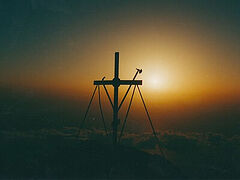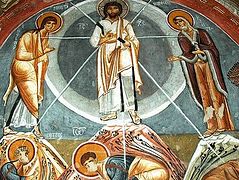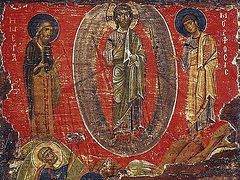And after six days Jesus taketh Peter, James, and John his brother, and bringeth them up into an high mountain apart, and was transfigured before them: and His face did shine as the sun, and His raiment was white as the light (Mt. 17:1-2).
In the life of the Lord there were many wonderful deeds, significant events and extraordinary manifestations of His Divinity, but none was as striking as His Holy Transfiguration. The Savior was praying on the top of the mountain (Mount Tabor) in the darkness of the night. While His three weary disciples were immersed in deep sleep, the Lord took upon Himself—or, rather, revealed in Himself—the light of the sun. His shining garments became as white as the light, and the two greatest prophets of the Old Testament—Elias and Moses— appeared before Him in reverence. The night became bright and the entire mountain was in an unearthly, wondrous light. Awakened, His disciples marveled, admired and tremblingly contemplated all this unprecedented spectacle.
For whom and for what purpose was this glorious vision? Certainly not for people, because the people standing far below were not witnesses to this miracle. And not for the disciples either, because they only had a few minutes to enjoy the vision. Therefore, the Transfiguration was for the Lord Himself. Let’s consider this carefully. The end of His earthly life was already approaching, and more than once in His humanity He looked back at everything He had done and wondered about what He had achieved. What did the Lord see? Three years of His tireless service to the human race were behind Him: preaching, miracles of healing and calls to people. And what was their response? Unbelief, from some slander, from others indifference, and the ostensible and fickle affection of the crowd. And an even darker future awaited Him. Very soon the insidious powers that be, filled with malice, would rise against Him and keep watching Him closely; then there would be the betrayal by one of His disciples, the biased, unjust trial, suffering and torment, and a shameful death on the Cross.
With His Divine eyes He clearly foresaw everything that awaited Him, and as a Man He could not help but feel the difficulty of His situation and exhaustion from overexertion; His soul was troubled and He needed support from above to complete His great mission—the salvation of the human race, which is sinful, unfaithful and ungrateful. The Gospel openly reveals to us this state of the Lord's soul before the hour of His Passion: My soul is exceeding sorrowful, even unto death (Mt. 26:38), He said to His disciples. Those of us, dear friends, who have ever experienced real sorrows will understand these words. They will feel that these words proceed from the great agony of one’s entire being. They will at least partially understand Just what kind of soul, which has suffered greatly, does not expect anything from life, and has lost faith in the future, is crying out. And He fell on His face deep in prayer before His Heavenly Father, imploring Him: O My Father, if it be possible, let this cup pass from Me (Mt. 26:39)!
How clear all the events of the Transfiguration of the Lord are now! He has climbed a high mountain. There below, at its foot, He has left the whole world (for which He came with holy goodness, and so willingly took upon Himself the great task from His Heavenly Father), which responded to Him with such unbelief; now people unthinkingly pay Him royal honors, now shout scornfully: “Crucify, crucify Him!”. He has been transfigured; this is no longer the meek, humble and grieving Jesus, as He seemed to be a minute ago. His appearance is now Divine; He is emanating the light of the sun; His face and garments, and indeed the whole area have been illuminated by Divine glory. We believe that at this moment He can see all the future glory of the Kingdom of God on earth. Looking beyond the terrible events of the final day of His earthly life, He is contemplating the holy faith spreading all over the globe, His disciples enlightening the world (recently so unfaithful), the saints of God performing great deeds of the Lord, and the whole earth, illuminated like a mountain with the light of truth, righteousness and great moral transformation. And at this solemn moment a voice can be heard from Heaven, calling Him the beloved Son and commanding the earth to obey Him. Oh, now the Lord will again move to His ministry and complete it. Let them lift Him up on the Cross—He has already seen the Heavenly Father, He is waiting for the glory that He had had before the world was created, and He is destined for victory over the world and triumph in Heaven. Such is the meaning of today's celebration in honor of the Transfiguration of the Lord.
And there are many edifying lessons for us, friends, in this wondrous event. The Lord has ascended a high mountain. Don’t we also learn from time to time to withdraw from the vanity of life and ascend the mountain of solitude, contemplation and prayer? Earthly life contains so many dark deeds, so much strife between brothers, so much evil, falsehood and perfidy. Oh, let’s hasten to the mountain—to solitude; let’s lift up our eyes to Heaven; let’s make all these passions, vanities and untruths fall silent; let’s forget this world, immersing ourselves in silent inner prayer. The Lord has been transfigured. This means that peace, hope and enlightenment have begun to reign in His soul; and this regeneration of the soul was reflected in His face, on His garments, and on the whole mountain. This, my friends, is what makes a person strong is his soul—when it is awakened, enlightened and filled with grace! Look at a righteous or simply kind-hearted person—his pious, simple and sincere soul shines in everything he does; he is not afflicted by sorrows; he is animated by joy; he is encouraged by hope; he believes in a glorious future.
But why did these two great prophets, Elias and Moses, join Christ and converse with Him? They are two representatives of the future glorious Kingdom of God on earth. Moses guided the Israelites to the Promised Land; Elias, who exposed falsehood, wickedness, and enmity, was taken to Heaven on a fiery chariot. There will always be preachers of goodness and light in the world; the best people will always shine as examples for the edification of the world. There will always be guides to a better world—to a blissful life in Heaven. There is no need to be troubled: better times will come; the earth will be illuminated by the light of righteousness and truth; our world, now gloomy and weak, will be transfigured and transformed into the glorious Kingdom of God.
Let’s pray on this day of the Transfiguration of the Lord together with the Church: “Let Thy everlasting light also shine upon us sinners… O Giver of light!” Amen.
August 6, 1914.




